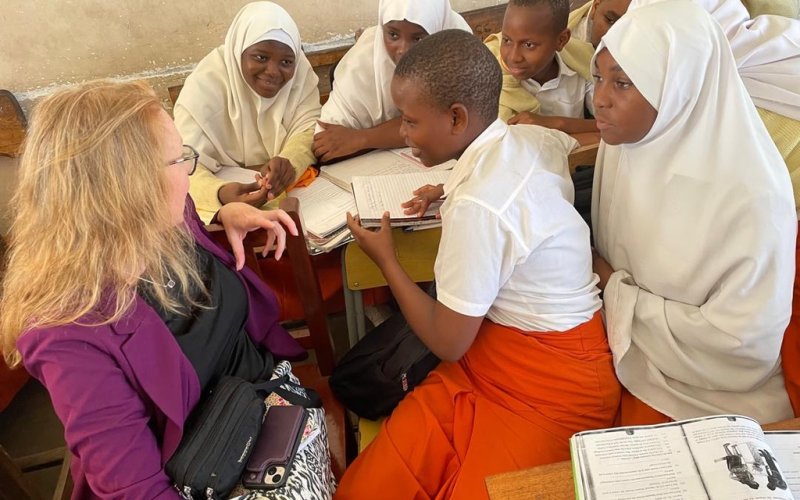Empowering Teachers in Tanzania: 5 Questions with Angel Ford

By Mike Nolan
ALBANY, N.Y. (July 16, 2024) — Angel Ford of the College of Emergency Preparedness, Homeland Security and Cybersecurity (CEHC) is spending her summer in the classroom — 7,500 miles away from the University at Albany.
Ford, an assistant professor in CEHC’s Department of Information Sciences and Technology, is in Zanzibar, Tanzania, working with K-12 teachers on Pemba Island to improve their learning environments and develop an English language curriculum.
The project is supported through the Fulbright Specialist Program, part of the larger Fulbright Program, run by the U.S. Department of State. The program pairs U.S. academics and professionals with host institutions abroad to share their expertise, strengthen institutional linkages and learn about other cultures while building capacity at their overseas host institutions.
Since 1946, the Fulbright Program has provided more than 400,000 students, scholars, teachers, artists and professionals of all backgrounds with funded opportunities to study, teach and conduct research abroad. Eight faculty members from UAlbany were selected for Fulbright awards during the 2023-24 academic year, placing the University among the top 10 doctoral institutions for U.S. scholars this year.
Ford is being hosted by the Tanzanian government from July 1 through Aug. 9. We caught up with her to learn more about the project and how it fits into her larger research interests.
How did you get involved with the Fulbright Specialist Program?
I’ve been interested in international work since my enlisted days in the United States Air Force, and I became involved with the Fulbright program when I was a Fulbright Scholar for the 2019-2020 academic year. For that assignment, I lived in Addis Ababa, Ethiopia, but worked throughout the country supporting several initiatives through the U.S. Embassy. Since then, I have remained interested in and supportive of colleagues in East Africa. When I started at UAlbany in the fall of 2024, I inquired with my department chair about applying to the Fulbright Specialist Program, since the projects are normally only around four to six weeks. She was supportive, so I applied and was accepted onto the roster.
Can you share more about your work with teachers on Pemba Island?
I will be working with teachers and educational leaders throughout the island on their secondary curriculum for learning English as a second language. I will be partnering with colleagues at the University of Dar es Salaam in Tanzania, who will provide local context to the curriculum development and pedagogy decisions. I will also be focused on delivering trainings for writing in English, competency-based education, assessments and creating positive learning environments.

What do you hope to accomplish during your time aboard?
I want to make an impact on the teachers, which will ultimately improve the experiences of the students. I hope to work closely with classroom teachers, school librarians and school leaders as well as a couple of representatives from the Ministry of Education. If possible, I’d like to form a pen pal communication between some of the high school students on Pemba Island and local Capital Region high schoolers.
Your research is closely tied to equity, including improving learning environments abroad. How rewarding is it to support educators through this program?
I anticipate this work will be extremely rewarding. I hope to provide meaningful trainings that will have a long-lasting impact. I’d also like to stay in contact with the Ministry of Education representatives and the educators, and continue to send them resources as they become available. I plan to be back in East Africa several times over the next few years and if all goes well, I plan to travel back to Pemba Island and see the ongoing impact of the trainings.
Do you plan to take what you learn this summer and apply it to your work at CEHC?
Yes. I incorporate my international experiences into my teaching and research at CEHC and I anticipate this experience will be no different. I will tell my students about cultural differences and encourage any of them who are interested to investigate student exchange programs or other ways to work cross-culturally. Infinite lessons come from relationship building across national borders, ideological differences, and the unique ways we view the world. With each of my international experiences, I feel my eyes are opened to new ways of viewing global populations and I work to share those new ways with my students and peers.




